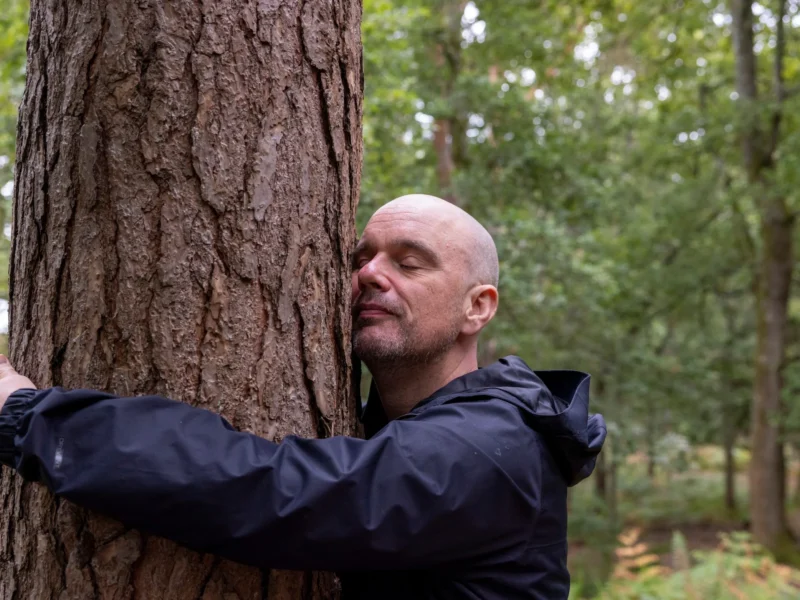In our fast-paced, technology-driven world, finding moments of peace and relaxation can be challenging. The constant bombardment of emails, social media notifications, and the demands of modern life can leave us feeling stressed and disconnected. However, there is a simple yet profound way to reclaim our sense of calm and reconnect with ourselves: forest bathing.

What is Forest Bathing?
Forest bathing, or “shinrin-yoku,” is a practice that originated in Japan in the 1980s as a form of nature therapy. It involves immersing oneself in a forest environment, engaging all five senses to absorb the sights, sounds, smells, textures, and even tastes of the natural world. Unlike hiking or other outdoor activities, forest bathing is not about exercise or reaching a destination; it is about being present in the moment and experiencing the forest in a mindful, contemplative way.
The Origins of Forest Bathing
The term “shinrin-yoku” was coined by the Japanese Ministry of Agriculture, Forestry, and Fisheries in 1982. The practice was developed as a response to the increasing stress and mental health issues faced by urban populations. The idea was to create a therapeutic way for people to reconnect with nature and improve their overall well-being. Over the years, forest bathing has gained popularity worldwide, with numerous studies supporting its benefits for mental and physical health.
The Science Behind Forest Bathing
Research has shown that spending time in nature, particularly in forests, has numerous health benefits. Here are some of the key findings:
- Reduced Stress Levels: Studies have found that forest bathing can significantly reduce levels of cortisol, the body’s primary stress hormone. The serene environment of the forest helps to calm the mind and body, promoting relaxation and reducing anxiety.
- Improved Mood: Exposure to nature has been linked to increased levels of serotonin, the neurotransmitter responsible for regulating mood and promoting feelings of happiness and well-being. Forest bathing can help alleviate symptoms of depression and boost overall mood.
- Enhanced Immune Function: Forests are rich in phytoncides, which are natural compounds released by trees and plants. Inhaling these compounds can boost the activity of natural killer (NK) cells, which play a crucial role in the body’s immune response to viruses and cancer.
- Lower Blood Pressure: Spending time in a forest environment has been shown to lower blood pressure and heart rate, reducing the risk of cardiovascular diseases.
- Improved Cognitive Function: Nature exposure has been found to enhance cognitive function, including attention, memory, and creativity. Forest bathing can help clear the mind, improve focus, and boost productivity.
- Increased Energy Levels: Being in nature can invigorate the body and mind, leading to increased energy levels and reduced feelings of fatigue.
How to Practice Forest Bathing
Forest bathing is a simple and accessible practice that anyone can enjoy. Here are some tips to get started:
- Choose the Right Location: Find a forest or wooded area that is easily accessible to you. It doesn’t have to be a vast wilderness; even a small park with trees can provide the benefits of forest bathing.
- Leave Technology Behind: To fully immerse yourself in the experience, leave your phone and other electronic devices behind. This will help you stay present and focused on your surroundings.
- Slow Down: Unlike hiking or other outdoor activities, forest bathing is about moving slowly and mindfully. Take your time to explore the forest at a leisurely pace, allowing yourself to fully experience each moment.
- Engage Your Senses: Use all five senses to connect with the forest. Listen to the sounds of birds chirping, leaves rustling, and water flowing. Notice the different shades of green and the patterns of sunlight filtering through the trees. Smell the earthy scent of the forest floor and the fragrance of wildflowers. Touch the rough bark of a tree, the softness of moss, and the coolness of a stream. If it’s safe to do so, you can even taste edible plants or berries.
- Find a Comfortable Spot: Find a spot in the forest where you can sit or lie down comfortably. This could be a rock, a fallen log, or a patch of soft grass. Take a few deep breaths and allow yourself to relax and soak in the natural surroundings.
- Be Present: Practice mindfulness by focusing on the present moment. If your mind starts to wander, gently bring your attention back to your senses and the environment around you. Let go of any thoughts or worries and simply be in the moment.
- Stay as Long as You Can: While even a short forest bathing session can be beneficial, try to spend at least 30 minutes to an hour in the forest. The longer you stay, the more you can immerse yourself in the experience and reap the benefits.
Incorporating Forest Bathing into Your Life
Forest bathing can be practiced in various ways to suit your lifestyle and preferences. Here are some ideas for incorporating forest bathing into your routine:
- Daily Walks: If you live near a park or wooded area, take daily walks to enjoy the benefits of nature. Even a short walk can help clear your mind and boost your mood.
- Weekend Retreats: Plan weekend trips to nearby forests or nature reserves. Spending an entire day or weekend in nature can provide a deeper sense of relaxation and rejuvenation.
- Lunchtime Breaks: If you work in an urban environment, find a nearby park to visit during your lunch break. Taking a break in nature can help you recharge and improve your focus for the rest of the day.
- Nature Meditation: Combine forest bathing with meditation by practicing mindfulness exercises in a natural setting. Sit quietly and focus on your breath, or try a guided nature meditation to enhance your experience.
- Group Outings: Invite friends or family to join you for a forest bathing session. Sharing the experience with others can enhance the sense of connection and make it more enjoyable.
The Healing Power of Nature
The practice of forest bathing is a testament to the healing power of nature. By immersing ourselves in the natural world, we can restore balance to our minds and bodies, reduce stress, and improve our overall well-being. In a society that often prioritizes productivity and technology, forest bathing offers a much-needed opportunity to slow down, reconnect with nature, and nurture our health and happiness.
Whether you are seeking relief from stress, a boost in mood, or simply a deeper connection with the natural world, forest bathing can be a transformative practice. Embrace the tranquility of the forest, engage your senses, and let the healing power of nature rejuvenate your mind, body, and spirit.










